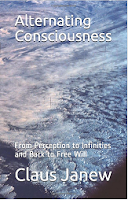Radical constructivism was initially formulated by Ernst von Glasersfeld.
Radical constructivists do not speak of creating reality, but of
constructing reality. What is the difference?
"Creating reality" ultimately means creating everything, without exception. "Constructing reality"
means interpreting external "disturbances" and thus shaping effects.
Thus the constructivist has the lesser claim, but at the price of
inconsistency. He cannot avoid including an external cause of effect that essentially
determines his construction. In principle, however, he cannot and does not want
to know by what this obviously pre-structured effect is exerted. What is
important is only what is useful in the context of one's own life, whereby
"usefulness" is equally constructed and thus co-determined by this
external something, and so on.
Instead, he might well admit that there is an external reality, the effect of which he is only further constructing. But he would not be saying anything essentially new. And once he admits its pre-structuring, he might as well go on to ask what else there is to "pre-recognize". And with that, he abolishes the radicality of constructivism.
On the other hand, can there be a complete creation of reality by us? Yes, if you redefine what is
meant by "us". If I say, "I create reality," and by
"I" I mean my waking, conscious ego, this is an enormous abridgement.
The ego perceives, chooses and gives impulses. These are its contributions. But with the creation of
heaven and earth at the latest, it would be hopelessly overtaxed.
The amazing thing about the I is that on the one hand it has no final limit
anywhere, and on the other hand it is
unique. And moreover, that this is true for every place of effect. Because it
means that there is a priority hierarchy of effects that extends into all the
other individuals - those extended I's and places - without merging with them.
So I - as an infinite individual - create my reality completely, including
heaven and earth. More or less consciously. What remains after the death of my
awake conscious ego are the realities of other individuals. And after humanity,
there are all the other realities.
But are the worlds of other individuals real to me? Yes, insofar as I can
put myself into them, return back, and remember that potential. And insofar as all unlimited individuals attune out of
these movements an approximate reality that is less alien (but still
individual) to them.
Ultimately, we are dealing with an explorable dynamic reality behind the
apparent effects, and an individual reality constantly re-condensing out of a
high-frequency alternation of individuals. I contribute to the reality of others only as an aspect of this
exchange, but the constructivist "hollow shell" is dynamically
filled.
 |
| Created by AI based on this text so far |
Is there even a "being" that exists independently of me and any consciousness?
No. The boundary between perception and "being" is already
bridged by the fact that in order to imagine a "being" we have to
"enter" it a little. Even if we do not want to imagine a being, but
are forced to define a limit of the perceptible, we have already crossed it in
principle. So the relativity of this limit is nothing new. If we now examine
what is at stake in these crossings and limits, we find the fundamental dynamic
of the point of observation (ultimately of the individual).
Therefore, the alternation of perception is the fundamental thing, and its
relative constancy requires justification - just like our habit of conveniently
holding artificially detached "things" to be equally valid for all.
We then call them "real". But upon closer examination, this reality
is an individually and collectively created one, which appears more or less
stable depending on the depth of consciousness of the dynamic construction. And
since there is no ultimate limit, there is no limit to this depth, either. What
needs to be explained instead is the limitation of our self-consciousness.

